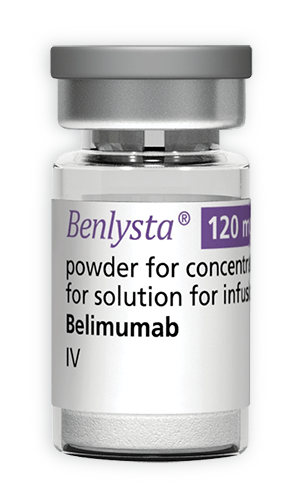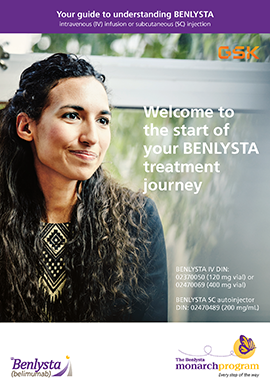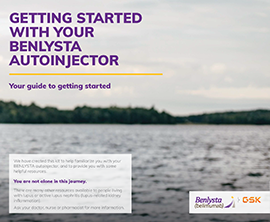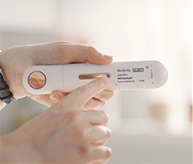Now that you’ve been prescribed BENLYSTA, it’s important to follow your doctor’s instructions.
BENLYSTA is a prescription drug used to treat:
- Adults with lupus (systemic lupus erythematosus, also called SLE) who are also receiving other medicines for lupus
- Adults with lupus-related kidney inflammation (active lupus nephritis) who are also receiving other medicines for lupus
Which formulation of BENLYSTA are you receiving?
BENLYSTA lyophilized powder
for intravenous (IV) infusion

BENLYSTA autoinjector for
subcutaneous (SC) injection

For the autoinjector, your healthcare provider will show you or your caregiver how to inject BENLYSTA. Your healthcare provider may then decide that you or your caregiver may inject BENLYSTA. Do not try to inject BENLYSTA yourself until you have been shown the right way to give the injections by your healthcare provider. Please see the BENLYSTA AUTOINJECTOR INSTRUCTIONS FOR USE in your package of BENLYSTA.
The resources below will help you answer questions you may have about BENLYSTA and your treatment journey.
Resources to help you get familiar with BENLYSTA

Get to know BENLYSTA
BENLYSTA Patient Brochure
Learn how BENLYSTA works and what to expect during your treatment.

BENLYSTA for SC injection
BENLYSTA SC Patient Booklet
Review the instructions for use for the BENLYSTA SC autoinjector as well as tips and resources to help you get started with your treatment.

BENLYSTA SC Patient Video
Watch the video to review step-by-step instructions on how to use your BENLYSTA SC autoinjector.

The BENLYSTA MONARCH PROGRAM Booklet
Learn about The BENLYSTA MONARCH PROGRAM and the services it has to offer.
Please return regularly, as new resources will be added as they become available.
If you need to report an adverse event for any GlaxoSmithKline product, please call: 1-800-387-7374.
BENLYSTA (ben-LIST-ah) is a prescription drug used to treat adults with lupus (systemic lupus erythematosus, also called SLE) as well as adults with lupus-related kidney inflammation (active lupus nephritis), who are also receiving other medicines for lupus.
BENLYSTA is not approved for use in children less than 18 years old.
It is not known if BENLYSTA is safe and effective in people with severe active central nervous system lupus. It is not known if BENLYSTA is effective in treating SLE in people of Black ethnicity.
Do not take BENLYSTA if you have an allergic reaction (hypersensitivity) to BENLYSTA or to any ingredients in it.
Serious warnings and precautions for BENLYSTA
Allergic and infusion/injection reactions including anaphylaxis
BENLYSTA can cause a reaction to the infusion/injection or an allergic (hypersensitivity) reaction. Occasionally, these reactions can be severe, and can cause death. They are more likely to happen on the day of treatment, but can happen later. Call your healthcare provider right away if you get any of the symptoms listed under Allergic and infusion/injection reactions in this website.
Severe infections
Patients receiving BENLYSTA may have a higher chance of getting infections. Infections may be serious and can lead to death. Call your healthcare provider right away if you feel sick or get any of the symptoms listed under Infection in this website.
Progressive multifocal leukoencephalopathy (PML)
PML is a serious brain condition that has been reported in patients receiving BENLYSTA and other drugs that weaken the immune system. Death has occurred. The signs and symptoms of PML may include but are not limited to: memory loss, trouble thinking, confusion, problems with vision, difficulty with swallowing, talking, or walking, or seizures. Call your healthcare provider right away if you have any new or worsening experiences of the above symptoms. Please see the section called Progressive multifocal leukoencephalopathy (PML) in this website.
Suicidal thoughts, suicide attempts, or self-harm
Tell your healthcare provider right away if you have thoughts of harming yourself or committing suicide. Please see the section called Mental health problems and suicide in this website.
What are possible side effects from using BENLYSTA?
Very common side effects in BENLYSTA studies (either IV infusion or subcutaneous injection) include:
- nausea, diarrhea, fever, headache, infections, injection site pain* / redness* / itching / swelling* / bruising*.
* Subcutaneous injection only.
Common side effects in BENLYSTA studies (either IV infusion or subcutaneous injection) include:
- stuffy or runny nose, sore throat, bronchitis, trouble sleeping, pain in legs or arms, depression, vomiting, stomach/abdomen pain, bladder or kidney infections or painful urination, toothache, pain, sudden high blood pressure, speech difficulties, painful joints, yeast infection in women, fast heartbeat, fatty liver, indigestion, weight gain, dry eyes, allergic reaction, changes in lab tests including: decreased white blood cell count (leucopenia/neutropenia), white blood cells in urine (leukocyturia), low potassium (hypokalemia).
Allergic and infusion/injection reactions: BENLYSTA can cause a reaction to the infusion/injection or an allergic (hypersensitivity) reaction. These can affect 1 to 10 users in 100. Occasionally, these reactions can be severe, and can cause death. They are more likely to happen on the day of treatment, but can happen later, even 5-10 days after a dose of medication (or before or after that time). Symptoms of a reaction to the infusion/injection and hypersensitivity (also known as anaphylaxis) are similar, and can include breathing difficulties or shortness of breath, wheezing, tongue, throat or face swelling, itching, rash, fever, low blood pressure (can cause light-headedness when you stand up), high blood pressure, slow heartbeat, muscle pain, joint pain, dizziness, nausea, fatigue, and headache. Tell your healthcare provider if you have any of these signs or symptoms.
Infection: BENLYSTA is a drug that affects your immune system. Patients receiving BENLYSTA may have a higher chance of getting sick or getting infections including chest infection, kidney infection, infection of nose and throat, bowel infection, etc. These can affect more than 1 in 10 users. More patients with serious infections receiving BENLYSTA in clinical trials died than did patients receiving placebo.
Call your healthcare provider right away if you feel sick or get any of the following symptoms, which may be early signs of a serious infection:
- fever
- feeling very tired
- cough, breathing problems
- flu-like symptoms
- warm, red, or painful skin
- diarrhea, vomiting
- burning sensation while passing urine
Other symptoms of infection may include:
- chills
- pain with urination or urinating often
- bloody diarrhea
- coughing up mucus
You should not start taking BENLYSTA if you have an infection unless your healthcare provider says it’s okay.
Progressive multifocal leukoencephalopathy (PML): PML is a serious and life-threatening brain condition. Your chance of getting PML may be higher if you are treated with medicines that weaken your immune system, including BENLYSTA. Call your healthcare provider right away if you have memory loss, trouble thinking, confusion, difficulty with talking, swallowing, or walking, loss of vision, seizures, or similar problems that have lasted over several days. If you had these symptoms before treatment with BENLYSTA, tell your healthcare provider immediately about any changes in these symptoms. It is advisable that your healthcare provider refers you to a neurologist or an appropriate specialist.
Cancer: BENLYSTA may decrease your immunity. Medicines that affect the immune system may increase the risk of certain cancers.
Mental health problems and suicide: Symptoms of mental health problems when receiving BENLYSTA can include:
- thoughts of suicide or dying
- thoughts of hurting yourself or others
- attempting to commit suicide or acting on other dangerous impulses
- trouble sleeping (insomnia)
- new or worse anxiety
- new or worse depression
- other unusual changes in your behaviour or mood
Tell your healthcare provider if these feelings change or get worse when using BENLYSTA.
For more information about BENLYSTA, please consult your healthcare provider or consult the Consumer Information section of the Product Monograph available at https://ca.gsk.com/media/6151/benlysta.pdf or by calling 1-800-387-7374.

